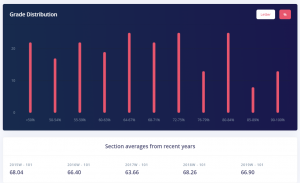A chance to further advance your 2nd year organic chemistry knowledge. CHEM 330 is a one of the hardest courses I’ve taken at UBC; however the nuanced content also made this an interesting organic chemistry course.
format of the course
There are lots of assessments in this course relative to your standard university course. When I took it, there were weekly problem sheets along with two huge problem sets that were all worth a substantial portion of your mark (they were quite challenging as well). Lectures were taught in a smaller lecture hall via chalk and blackboard. This means that you definitely couldn’t miss lecture as the notes would otherwise not be available online. There was also a midterm and final exam both composed of fill in the products/reagents, synthesis, and mechanism type questions. You also needed to memorize random trivia like the pKa of different organic compounds and certain bond energies.
The content was basically an extension of CHEM 213, in terms of looking at the reactions in more detail. A concept that I really enjoyed was the stereochemical control of nucleophilic addition to a carbonyl and how the stereochemistry of the alpha carbon could dictate how the nucleophile would attack the carbonyl carbon. In CHEM 213, this fact would have likely been glossed over, but in CHEM 330 we studied in-depth the mechanism behind this phenomenon.
gpa 🙂 or 🙁
This course is a massive GPA dropper and it is unclear whether there was scaling. I spent two courses worth of time studying for this course, as not only do you have to memorize a ton of reactions, you also have to learn how to use them together when faced with a synthesis problem or draw on your understanding of these reactions when confronted with a mechanism problem. I managed to get the 3rd highest midterm mark; however, this was around 91-93 which is appallingly low when the same mark in most courses wouldn’t be noteworthy of a top 3. For some reason, the professor let everyone know what the top 10 marks were, and these marks ranged all the way down to high 70s. The average for this course in 2019W was 72. The distribution is quite variable as this was a small class of 60.

CHEM 330 grade distribution. Credits: ubcgrades.com
verdict: to take or not to take
While I don’t regret taking this course it’s definitely not something I would want to take again. In a way, this course helped me discover that organic chemistry wasn’t for me. If you’re super interested in organic chemistry, this course will truly test the extent of your interest.

